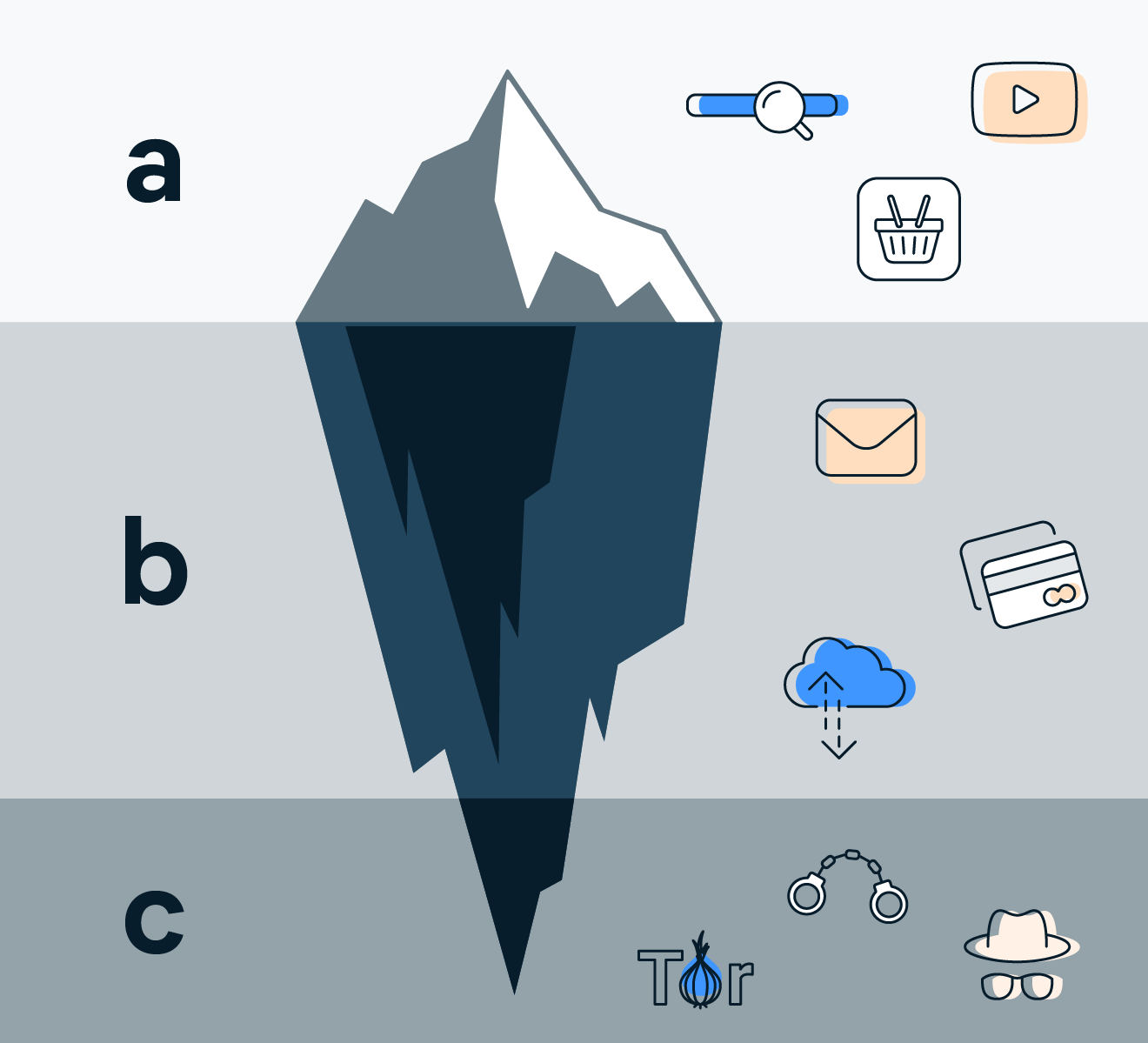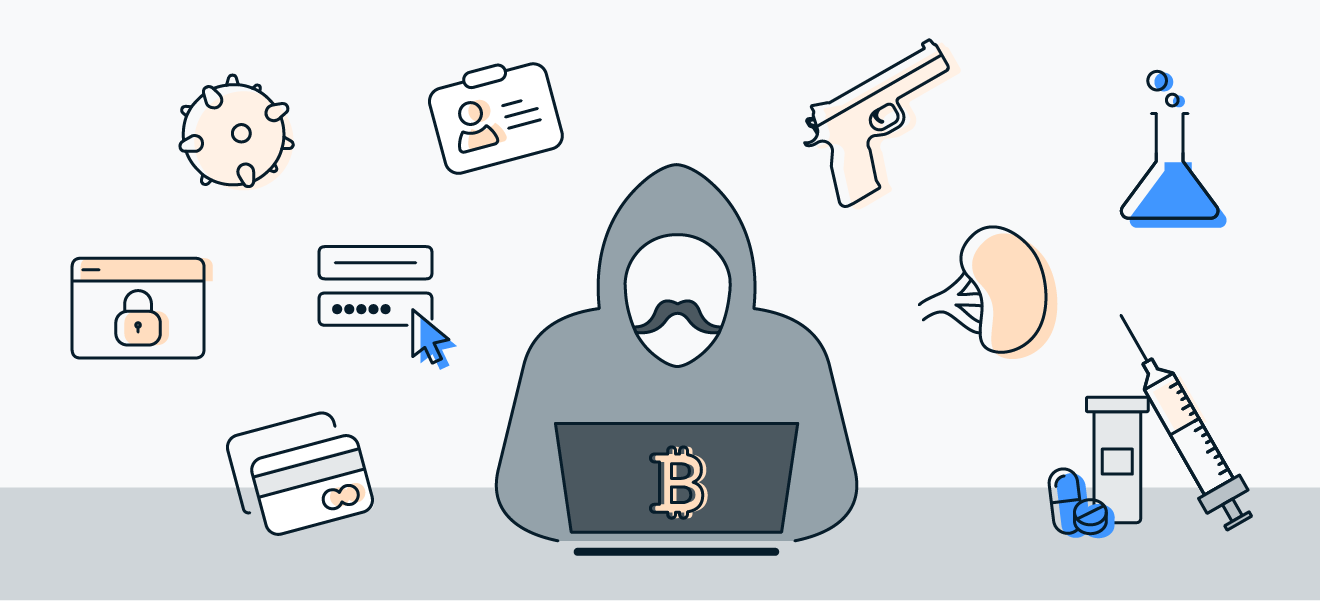What Is the Dark Web and How to Access It?
The websites you visit every day represent just a small fraction of the whole internet. Beyond this “surface web” is the deep web, and within the deep web is the dark web. Find out what the dark web is and how you can access it. Then get a data-monitoring tool like Avast BreachGuard to keep your personal information safe.
The dark internet is designed to provide anonymity by keeping communication private through encryption and routing online content through multiple web servers. While the dark web is often depicted as an anarchic forum for criminal activity, that’s not necessarily true. The darknet is simply an anonymous space on the web that can be abused or appreciated in turn.
Dark web vs. deep web: what’s the difference?
The difference between the dark web and the deep web is that the deep web refers to websites and web pages that aren’t indexed by search engines, like login pages and payment portals. The dark web, by contrast, is configured on darknets, which are online networks that can be accessed only with special software and techniques.
The deep web consists of any content that lives behind paywalls, authentication forms, logins, or passwords. Much of the content an average person accesses on the internet is part of the deep web: email, online banking accounts, private social media accounts, and subscription services. You wouldn’t want your email history available on the surface web and searchable by anyone.
Much of the content an average person accesses on the internet is part of the deep web: email, online banking accounts, private social media accounts, and subscription services.
The dark web is part of the deep web but is built on darknets: overlay networks that sit on the internet but which can’t be accessed without special tools or software like Tor. Tor is an anonymizing software tool that stands for The Onion Router — you can use the Tor network via Tor Browser.
Unlike typical web browsers, Tor Browser uses onion routing, which encrypts and routes traffic through multiple servers around the world to hide your IP address and provide private browsing. In addition, all domains on the Tor network end with the top-level domain .onion (instead of .com). The many layers of an onion represent the multiple layers of encryption in the Tor network.
 A: The surface web includes publicly searchable websites (blogs, shopping sites, news sites, YouTube).
A: The surface web includes publicly searchable websites (blogs, shopping sites, news sites, YouTube).
B: The deep web consists of sites that require a login to access (email, banking portals, subscription services).
C: The dark web requires special tools to access, like Tor Browser, and isn’t indexed by search engines.
How to get on the dark web
The quickest way to access the dark web is to download and install Tor Browser, which will route your traffic through the Tor network and let you access the dark web. On Tor, you can type in any URL you’d like to visit, including .onion domains on the dark web.
How to access the dark web safely
The safest way to get on the dark web is through the Tor network. For added safety, first connect to a VPN, then use Tor in a practice known as Tor-over-VPN. Many internet service providers (ISPs) and governments may be suspicious of Tor use, and a VPN will hide your internet activity and prevent anyone from knowing that you’re using Tor.
-
Connect to a reliable and safe VPN.
Conceal your IP address and encrypt your internet connection with a trustworthy VPN like Avast SecureLine VPN. Though they both provide encryption, a VPN and Tor are not the same thing. A VPN will prevent your ISP and anyone else from knowing that you're downloading and using Tor Browser.
-
Download and install Tor Browser.
Tor Browser is a free browser that routes your traffic through the encrypted Tor network. Download Tor Browser from the official Tor Project website, because unlicensed third-party downloads may come bundled with malware.
-
Browse the dark web with Tor Browser.
Tor Browser will let you access the .onion domains of the dark web. Because the dark web is largely unregulated, never visit dark websites without first confirming their authenticity.
-
Protect your identity.
The dark website isn’t always dangerous, but many scams do exist. When communicating or making purchases over the dark web, use encrypted and anonymous email addresses and pay with an anonymous cryptocurrency wallet.
Before accessing the dark web, install strong security software to keep your device protected.
Dark web tools and services
Dark web browsing is not as simple as regular web surfing, but there are some tools you can use to chart your journey. Dark web search engines and forums like Reddit can help you find reliable dark websites, and you’ll need to use a dark web browser to visit them.
Dark web browsers
The standard dark web browser is Tor Browser, which directs your browser traffic through the Tor network so you can reach the darknet. As your traffic passes through Tor, it’s encrypted and bounced between at least three relay points, known as nodes. This helps obscure the origin of the data (and makes it hard for anyone to find your IP address). But as a result, Tor Browser will feel much slower than a normal web browser.
Dark web search engines
Surface web search engines can’t access the dark web, but specialized dark web search engines can help you find what you’re looking for. DuckDuckGo is a popular privacy-focused search engine that doesn’t track you across the web when you use it. DuckDuckGo’s dark web search engine indexes pages on the dark web, but you’ll need to open it with Tor Browser.
Other dark web search engines include Not Evil, Torch, Haystack, and Ahmia. The subreddit r/deepweb is a good starting point for asking more experienced users about how to search the dark web and deep web for the content you want. Lastly, The Hidden Wiki is a collection of dark web links — but the links may not work and may lead to dangerous websites.
Dark websites
Dark websites can be visited only with a suitable dark web browser, and most dark web URLs are strings of seemingly random letters and numbers — nothing like the easy-to-remember web addresses on the surface web.
The Hidden Wiki is a surface website offering a collection of dark web links — but the links don’t always work, and they may not be safe. Use it to get an idea of what sort of dark websites you may be interested in visiting. But before visiting any sites on the dark web, get comprehensive cybersecurity software to protect yourself from any threats you may encounter.
The history of the dark web
The release of Freenet in 2000 is often cited as the beginning of the dark web. The thesis project of Ian Clarke, a student at the University of Edinburgh in Scotland, the Freenet was intended as a way to anonymously communicate, exchange files, and interact online.
In 2002, the dark web grew significantly when researchers supported by the US Naval Research Laboratory built and released the Tor network. At the time, the internet was still young, and tracking people was easy while staying anonymous was not. The Tor network was created to open safe communication channels for political dissidents and American intelligence operatives around the world.
The Tor network was created to open safe communication channels for political dissidents and American intelligence operatives around the world.
Later, Tor’s underlying code was released under a free license, and a nonprofit called the Tor Project was formed. In 2008, the Tor Browser was released, which made it easy for anyone to get on the dark web.
How big is the dark web?
The dark web may seem large, but it’s actually not very big. Researchers from Recorded Future estimated that while there are more than 55,000 existing onion domains, only 8,400 (or roughly 15%) of these sites were active. This means that the total network of live dark web sites is only about 0.005% of the size of the surface web.
Dark web domains tend to be inconsistent — new ones pop up and others disappear, which makes sense since some of these sites may be offering questionable or illegal goods and services.
The Tor Project says that of the 2 million people using Tor every day, only 1.5% of them are accessing hidden, or dark, websites. And most dark web websites are in English — according to one estimate, a staggering 78% of information on the dark web is in English.
What happens on the dark web today?
Because privacy and anonymity are the hallmarks of the dark web, it’s easy to assume that everything that happens there is illegal. And while plenty of cybercrime does take place, the dark web is used legally as well.
Some people simply prefer not to share any information online and use Tor to access normal websites outside the dark web, or to visit dark web news websites and forums.
Is the dark web used for illegal purposes?
Yes, the dark web is used for many illegal activities. It’s possible to buy and sell illegal drugs, malware, and prohibited content in darknet marketplaces. Some dark web commerce sites have dangerous chemicals and weapons for sale.
Some hackers offer ransomware as a service (RaaS), where cybercriminals can “rent” a strain of ransomware from its creator in exchange for a fee or a percentage of their ransom payments. Others sell software exploits that other cybercriminals can use to infect victims with malware and steal personal data.
The most well-known dark web marketplace was the Silk Road, which launched in 2011 and essentially functioned as an Amazon-like market for illegal drugs. In 2013, the FBI shut down the Silk Road, and its founder, Ross Ulbricht, is now serving a double life sentence.
 Dark web marketplaces offer a variety of illegal goods for sale.
Dark web marketplaces offer a variety of illegal goods for sale.
Fraud and scams run rampant on the dark web: offers too good to be true and fake services requiring upfront payment. Hackers sell access to email accounts, social media profiles, or other information that can be used for identity theft.
Avast Breachguard helps to keep your data off the dark web. By monitoring known dark web marketplaces, Avast BreachGuard will alert you immediately if and when your data is made available for sale. That way, you can change your passwords and protect your accounts before anyone can use your data against you.
Dark web marketplaces offer a range of both legal and illicit goods. Here’s a look at several of the illegal items you can buy — with prices — courtesy of Privacy Affairs’s Dark Web Price Index 2021.
|
Items on the dark web |
Dark web price |
|
Cloned Visa or MasterCard with PIN |
$25 |
|
Stolen online banking login, minimum balance of $2,000 |
$120 |
|
Hacked Coinbase account (verified) |
$610 |
|
Hacked Facebook account |
$65 |
|
Forged EU passport |
$4,000 |
|
Android malware, 1,000 instances |
$900 |
|
DDoS attack on unprotected website |
$15 (1 hour) to $1,000 (1 month) |
Data breaches often show up quickly on the dark web. When data brokers get hacked, the stolen data can include compromised credit cards, social security numbers, and other data, depending on what was exposed in the breach. This is a common way for identity theft and doxing attacks to occur.
If you become a victim, report the identity theft as soon as possible. And remember that there are better (and safer) ways to prevent identity theft than being forced to buy back your data off the dark web.
Avast BreachGuard monitors the dark web for data breaches around the clock. If a breach is detected, BreachGuard will notify you right away and help you take the steps you need to secure your data immediately.
Is the dark web dangerous?
The dark web can certainly be dangerous — with no regulation, it’s a riskier place to hang out than the surface web. Malware and scams are scattered like landmines around the dark web. And with many unfamiliar looking sites on the dark web, it’s harder to distinguish safe websites from shady ones, and easier to fall victim.
Regular dark web visitors know that it’s possible to exploit the sketchy reputation of the space and the services offered. And though some dark web marketplaces offer user reviews, not all do. Lack of regulation by authorities or other users makes it easy for cybercriminals to carry out scams.
Is it illegal to access the dark web?
The legality of accessing the dark web varies from country to country. In the US, visiting the dark web is legal, though using Tor without the safety of a VPN may draw scrutiny from your ISP as well as from the government. And while visiting the dark web may be legal, using it to engage in criminal activity is definitely not.
The dark web’s privacy protections are crucial for activists and whistleblowers.
The primary role of the dark web is anonymous browsing. Some people use this anonymity for illegal reasons, but the dark web’s privacy protections are crucial for activists and whistleblowers. Dark web domains can be vital for those living in countries where free speech is limited or banned and who want to share information or organize without being prosecuted.
So is the dark web illegal? On its own, no — but accessing it might be, depending on where you are. Always check your local laws before visiting the dark web, using Tor, or using a VPN.
Keeping yourself (and your data) off the dark web
Data breaches happen all the time, and your login credentials and other data might be on the dark web already. Unless you’re on the dark web yourself, the only way to know whether or not someone is selling your data is to perform a dark web scan.
Avast BreachGuard scans the dark web and will alert you immediately if and when it detects your personal data. BreachGuard will guide you through the process of recovering your accounts and protecting them before a hacker can use your leaked credentials. Secure your data and keep hackers out of your account with a specialized dark web monitoring tool.
FAQs
Is the dark web illegal?
Accessing and using the dark web is completely legal. The dark web limits online tracking, and there are many legitimate reasons people like journalists and activists use the dark web to remain private. But there are also many illegal activities that happen on the dark web. And just like in real life, using the dark web for criminal purposes is never legal.
If you use Tor to access the dark web or unblock websites, connect with a VPN for extra security. Because of the dark web’s association with illicit activity, your use of Tor may be tracked by your ISP, drawing unwanted scrutiny to your browsing behavior.
Can I access the dark web on my phone?
You can access the dark web on mobile with a dedicated dark web browser app. Install a mobile dark web browsing app — like Tor browser for Android or the Onion browser for iPhone — and enter a [dot] onion URL to start browsing.
As always, protect yourself from online threats with mobile Android security or iOS security software. And use a VPN for Android or VPN for iOS to get a secure, anonymous connection.
What is Tor?
Tor is a web browser used to stay anonymous online or access dark web. Tor shares similarities with VPNs and proxy servers in that all these tools enable some level of anonymous browsing. Tor can be used together with a VPN to provide powerful, overlapping levels of privacy and anonymity.
Is the dark web safe?
Accessing the dark web is not necessarily riskier than browsing the surface or deep web. And depending on what you’re using the dark web for, it may actually be safer because of its heightened privacy protections. To use the dark web safely, stick to recommended security practices, like clicking only on trusted links and using antivirus software. Using a VPN will add an extra layer of protection.
Can you be tracked on the dark web?
It’s very difficult to track online activity on the dark web. When you use Tor, which routes your internet traffic through many different relay “nodes,” your online activity is obscured because you’re browsing anonymously. Tor also supports various privacy extensions, but that doesn't mean it’s impossible to track users on the dark web. If you log into personal accounts on the dark web or visit websites with tracking scripts, then your activity may be tracked.








We respect your freedom of speech.
Please don't write anything that might violate someone else's privacy.